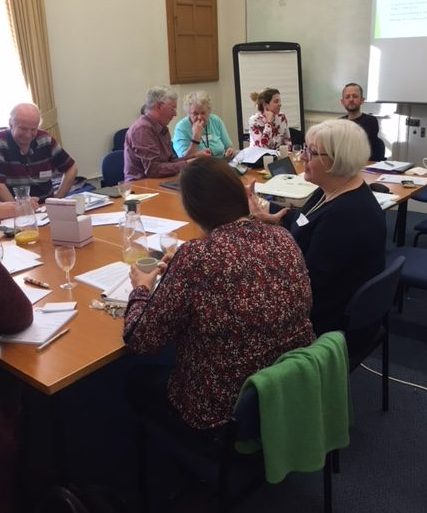

Richard Morley, Consumer Coordinator for Cochrane, and Sarah Chapman, from Cochrane UK, look ahead to the Cochrane Colloquium in September which, for the first time, is a Patients Included event. This blog post was first posted on Evidently Cochrane.
With the Cochrane Colloquium less than three weeks away we wanted to share how the plans are going to make this our first Patients Included conference, and what people who are coming to Edinburgh or planning to take part from a distance can expect.
The Colloquium is an annual scientific conference for the whole research community – amongst them are researchers, healthcare professionals, information specialists, and healthcare consumers (patients, care-givers, and family members – we have discussed these descriptors in this blog). This year’s theme, ‘Cochrane For All – better evidence for better health decisions’, was chosen to emphasise that Cochrane welcomes everyone, and that everything Cochrane does is about and for patients and other healthcare consumers.
Consumers have always been a part of the conference. But this year we have aspired to improve the experience, make the conference more relevant and increase the opportunities for participation, both in person and virtually. As a way of doing this we have successfully gained Patients Included status. Here’s how we are meeting (and exceeding!) the five Charter requirements. This approach has been at the core of our planning, which has actively involved consumers from the outset, and has influenced so much from the content and its delivery to the practicalities of welcoming a more diverse range of delegates and maximising opportunities for full and meaningful participation.

The cost of conference attendance is a huge barrier, and we recognise that even with a reduced rate for consumers, and a day rate available, it remains unaffordable for most people. We have worked hard to find ways to increase the financial support we can offer, to bring consumers to the conference. Our long-standing consumer stipend fund has been increased from £16,000 to £25,500 for this year and we are pleased to be supporting 22 people to come from all over the globe, with attendees from over 57 countries joining us. We are grateful to Mary Snow for establishing, in her daughter’s name, the Rosamund Snow Prize, to support two young people with experience of using health services to attend the Colloquium, as Citizen Reporters. Cochrane UK is supporting two consumers to come as members of the #BeyondTheRoom team (more of that below) and a number of Cochrane Review Groups and Centres have independently supported patient contributors to attend too. All of this means that number of consumers attending is over 50. As a proportion of 1200 registering to come, that might not seem a lot, but this represents four times as many as normally attend. It’s progress, and something on which to build.
“Little by little, one travels far”*
Of course, it’s not only about the numbers that attend. If you are going to be participating in the Colloquium, you might wonder how this will have changed the experience you can expect.
For a start you might be surprised to see the number of sessions (workshops, Special Session, oral presentations and plenaries) that have a direct relevance to patients. All abstracts were required to state their relevance to patients, or involvement of patients in the work being presented. Patient or healthcare consumers involvement and shared decision-making is a discrete theme this year. It’s the one that attracted the highest number of abstract submissions and a high selection rate too means that there are over 30 sessions on this topic in three days. At the request of people who advised us in the run up to the conference, we are delivering a workshop especially for newcomers, called Begin here! A non-scientist’s guide to Evidence Based Medicine, Cochrane and getting involved’.
In this conference, co-designed with consumers, we will benefit from them participating as co-presenters, as co-chairs of oral sessions, and as plenary speakers. This should improve the relevance and accessibility of sessions.
We are expecting to put into practice many of the suggestions that consumers made during our early consultations, ranging from alternative ways to ask questions during sessions and opportunities to continue exploring themes in keynote talks to spaces to rest and rooms to change clothes or express breastmilk.
Other support being offered to patients and other attenders is increasing too, including break and lunchtime opportunities to engage with experienced Colloquium attenders and to chat informally about Evidence Based Medicine, Cochrane, and getting involved. Stipend winners are offered a buddy to smooth their experience. We have a dedicated member of the Cochrane team who will be available to support consumers with any problems or questions they may have during the conference, and a WhatsApp group for those people who would like to communicate in this way.
We hope we will be joined virtually by many people who aren’t able to be at the conference in person and expanding the ways to get conference content out and bring other voices in is an important element of our work to make this a more inclusive event. For the first time at a Cochrane Colloquium, we will be taking the conversation #BeyondTheRoom. Beyond the Room is a digital conference service, started in 2016 by André Tomlin from the Mental Elf. Its aim is to increase the reach and impact of health events by live tweeting and podcasting from them, to involve people virtually and facilitate a much more democratic conversation. You can read more here.

I talked here about some of the obstacles we thought we might encounter in making this a Patients Included event, including possible resistance to the idea of co-producing and co-delivering the conference and, as Christin Lind highlighted in the #BMJDebate on including patients in conferences, the hurdle of “cultural expectations about what organizers think is expected, necessary, and appropriate”. I think we had not readied ourselves for criticisms of how we are falling short in our efforts, even before we have got to the event, and we are concerned that those involved this time or watching our efforts may decide that it’s all just too difficult to attempt another time. We are, of course, determined to learn both from what goes well and from what didn’t come off or could be done better.We will listen to what people have to say about our Patients Included Colloquium, evaluate the experience and share what learn.We are under no illusions about the limitations of what we’re doing, but we’re doing what is possible for us this year. We will work hard to ensure that what we do will be done as well as possible; that real progress is made, however small scale; that everyone attending, or participating virtually, will do so on equal terms; and that changes will be made that pave the way for more progress to be made in involving consumers in the work of Cochrane and its events.
Changing the way a massive conference, with a long history and expectation about how it works, is a major undertaking, and has involved many people. This includes the many consumers who have given their time in workshops, online, as part of the ongoing Patients Included Advisory Group, as part of the groups that go through the many abstract submissions, or the agonising process of choosing who might receive a consumer stipend. We owe all those who contributed, and are still helping, a huge thank you.
Peter Smart, a member of our Patients Included Advisory Group, gave this realistic assessment in a comment made by email last week:
“I am sure from the discussions I was at in Edinburgh that the initiative really is worth taking, and worth evaluating after the event to see where and how developments/improvements can be made in future years. It has taken a long time to get from the first model T Ford to today’s energy efficient car engines. I am sure #PatientsIncluded will be an iterative process for Cochrane, and future initiatives may even be dependent on the prevailing culture of future host cities.”
We are proud but not complacent about our efforts to make this a Patients Included conference. Like many research institutions we are part of a movement that is striving to find ways meaningfully to involve patients in health research. Last year we endorsed The Statement of Principles for Consumer Involvement in Cochrane. Attendance and participation of consumers at the Colloquium is one expression of this.
We have made a start, but this is not the end point. We were struck by this quote by Arthur Ashe (tweeted by @MightyCasey, who will be one of two consumer members of the #BeyondTheRoom team at the Colloquium) which we think encapsulates our current undertaking:
“Start where you are,
use what you have,
do what you can.”
We hope you will join us. The Colloquim takes place from 16 – 18 September 2018. You can find out more on the event website and join in on Twitter using the hashtag #CochraneForAll, where you can also find us @RMEngagement @SarahChapman30 and Colloquium hosts @CochraneUK.
Sarah’s note: *I was struck by this quote shared on Twitter last week. ‘Poco a poco se and a lejos’ – a Spanish proverb, translated as ‘Little by little, one travels far’. In searching for an image with it that I could share here, I read that it has been erroneously attributed to JRR Tolkien, and can also be translated as ‘little by little, one goes a long way/one goes far’.
